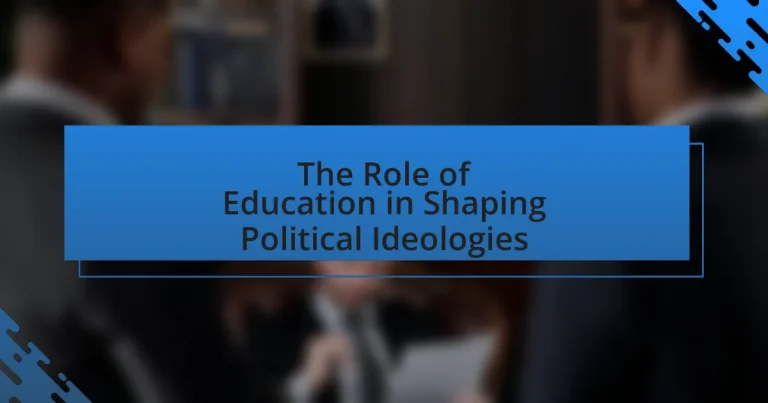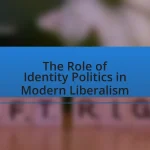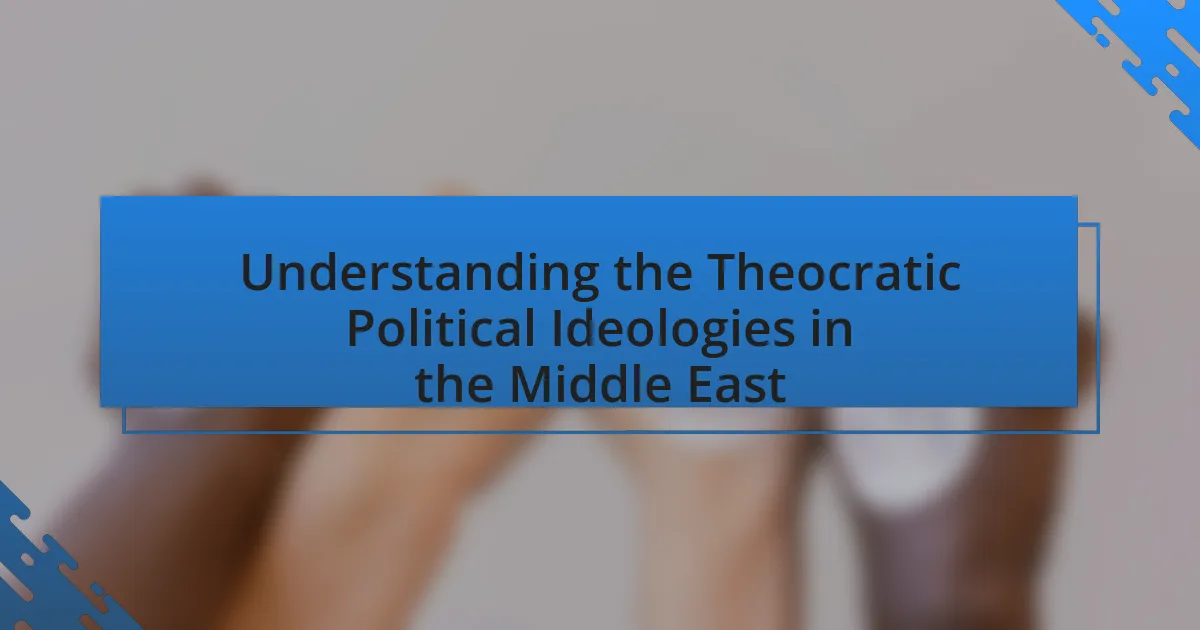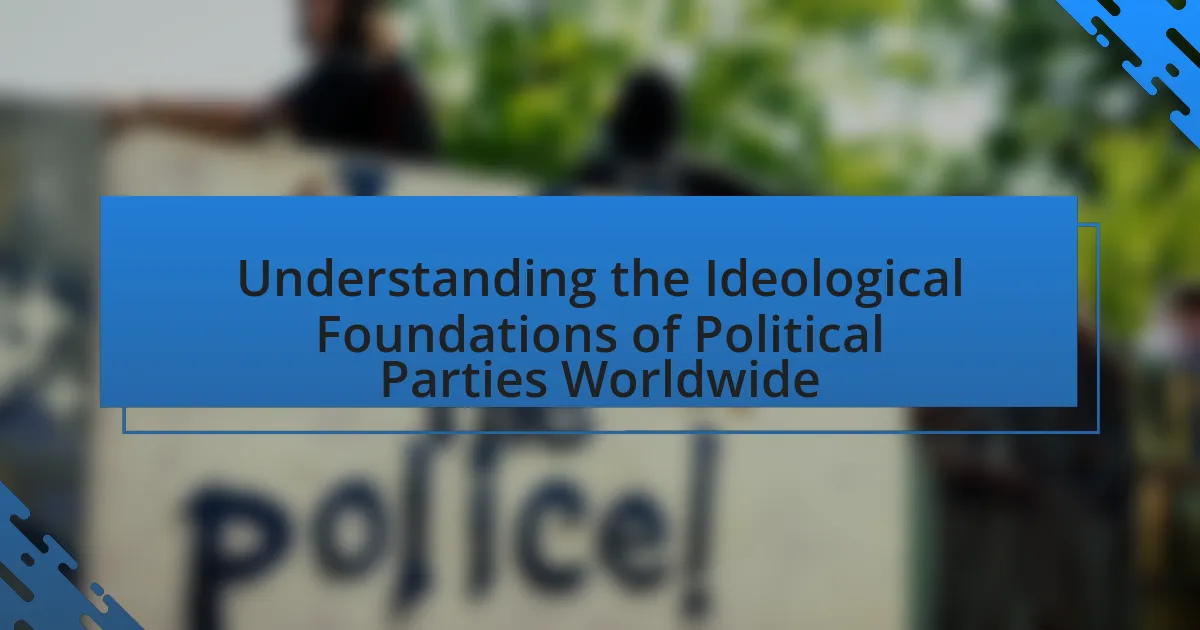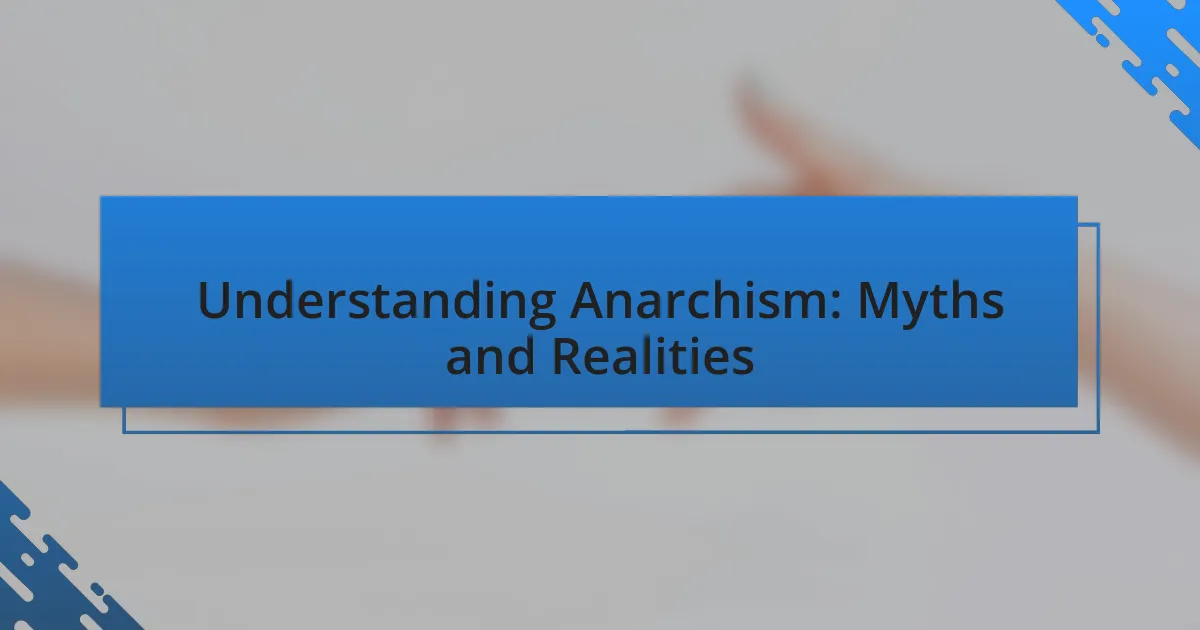The article examines the critical role of education in shaping political ideologies, highlighting how educational systems influence individuals’ beliefs, values, and civic responsibilities. It discusses the correlation between educational attainment and political engagement, noting that higher education often leads to more progressive views and increased participation in democratic processes. Key factors such as curriculum content, teaching methods, and socio-political contexts are analyzed for their impact on political thought. Additionally, the article addresses contemporary challenges, including misinformation and educational disparities, while proposing strategies to enhance critical thinking and civic engagement among students.
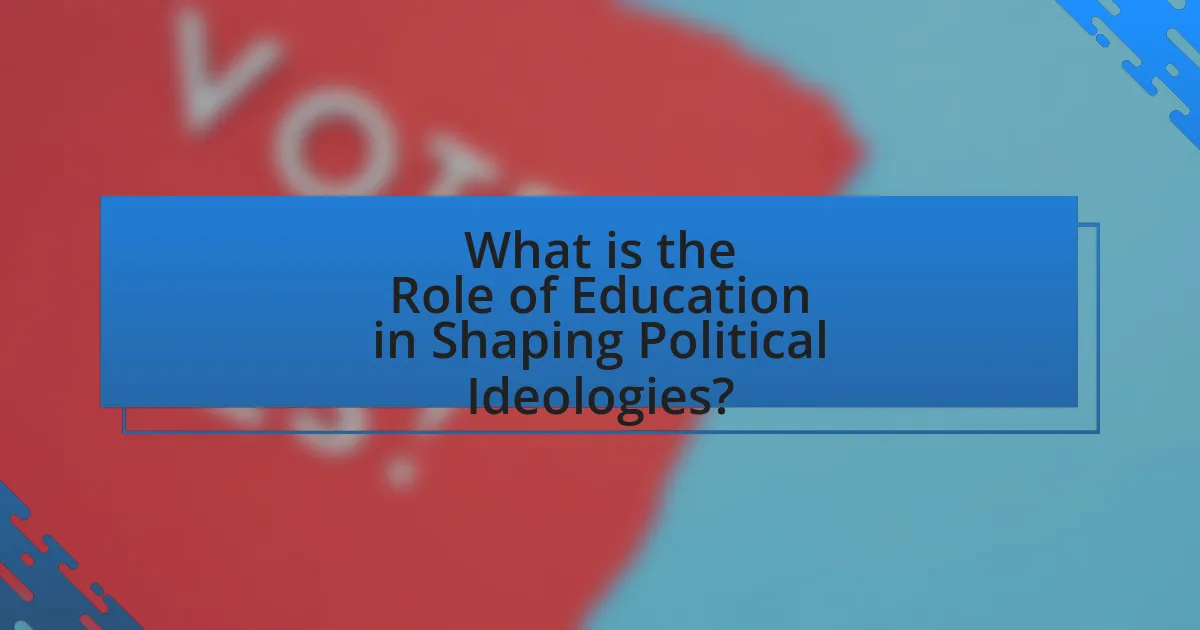
What is the Role of Education in Shaping Political Ideologies?
Education plays a crucial role in shaping political ideologies by influencing individuals’ beliefs, values, and understanding of civic responsibilities. Through curricula that include history, social studies, and critical thinking, education exposes students to various political theories and ideologies, fostering informed citizenship. For instance, studies have shown that higher levels of education correlate with increased political participation and more progressive views, as educated individuals are more likely to engage with diverse perspectives and question existing norms. This relationship is supported by research from the Pew Research Center, which indicates that educational attainment significantly impacts political alignment and engagement in democratic processes.
How does education influence individual political beliefs?
Education significantly influences individual political beliefs by shaping critical thinking skills, exposure to diverse perspectives, and understanding of civic responsibilities. Higher levels of education correlate with increased political engagement and liberal viewpoints, as evidenced by studies showing that college graduates are more likely to support progressive policies. For instance, research from the Pew Research Center indicates that individuals with a college degree are more inclined to favor social equality and environmental regulations compared to those with lower educational attainment. This relationship underscores how education not only informs individuals about political systems but also encourages them to engage in civic discourse and activism.
What are the key educational factors that shape political ideologies?
Key educational factors that shape political ideologies include curriculum content, teaching methods, and the socio-political context of educational institutions. Curriculum content influences students’ understanding of history, governance, and civic responsibilities, which can lead to the development of specific ideological perspectives. For instance, a curriculum that emphasizes democratic values and critical thinking fosters liberal ideologies, while one that focuses on nationalism may promote conservative views. Teaching methods, such as encouraging debate and discussion, can also shape how students engage with political ideas, promoting open-mindedness or reinforcing existing beliefs. Additionally, the socio-political context, including the values and beliefs of educators and the community, plays a crucial role in shaping the political ideologies of students. Research indicates that students exposed to diverse viewpoints in educational settings are more likely to develop nuanced political beliefs, as seen in studies conducted by the American Educational Research Association.
How do different educational systems impact political thought?
Different educational systems significantly impact political thought by shaping the values, beliefs, and critical thinking skills of individuals. For instance, countries with a liberal education system, such as Finland, emphasize critical thinking and civic engagement, leading to a more informed and participatory citizenry. In contrast, authoritarian educational systems, like those in North Korea, often promote indoctrination and discourage dissent, resulting in a populace that is less likely to challenge the status quo. Research indicates that educational curricula that include discussions on democracy and human rights foster political awareness and activism, as seen in various democratic nations where education promotes civic responsibility. Thus, the structure and content of educational systems directly influence the political ideologies and engagement levels of their citizens.
Why is education considered a tool for political socialization?
Education is considered a tool for political socialization because it systematically imparts knowledge about political systems, civic responsibilities, and societal values. Through curricula that include history, government, and social studies, educational institutions shape students’ understanding of their roles as citizens. For instance, studies show that students who engage in civic education are more likely to participate in political activities, such as voting and community service, thereby reinforcing democratic values. This process of learning not only informs individuals about political structures but also cultivates critical thinking and encourages active participation in civic life, making education a fundamental mechanism for fostering political awareness and engagement.
What role do teachers play in shaping political views?
Teachers play a significant role in shaping political views by influencing students’ critical thinking, civic engagement, and ideological perspectives. Through curriculum design, classroom discussions, and the modeling of democratic values, educators can foster an environment where students explore diverse viewpoints and develop their own political beliefs. Research indicates that students who engage in discussions about political issues in the classroom are more likely to participate in civic activities, such as voting and community service, thereby reinforcing the impact of teachers on political socialization. For instance, a study published in the “Journal of Political Science Education” by authors such as K. A. McDevitt and A. K. Chaffee highlights that teachers who encourage open dialogue about political topics contribute to students’ understanding of democratic processes and their role as informed citizens.
How do curricula reflect and influence political ideologies?
Curricula reflect and influence political ideologies by embedding specific values, beliefs, and historical narratives that align with particular political perspectives. For instance, the inclusion of certain historical events, such as the Civil Rights Movement or the Cold War, can shape students’ understanding of justice, equality, and governance, thereby reinforcing liberal or conservative ideologies. Research shows that educational content often mirrors the prevailing political climate; for example, in the United States, state education standards can vary significantly based on the political party in power, affecting how topics like climate change or immigration are taught. This alignment between curricula and political ideologies not only reflects societal values but also actively shapes the political beliefs of future generations, as students internalize the lessons presented in their education.
What historical examples illustrate the connection between education and political ideologies?
Historical examples that illustrate the connection between education and political ideologies include the establishment of the Prussian education system in the early 19th century, which was designed to promote nationalism and obedience to the state. This system emphasized a standardized curriculum that instilled loyalty to the Prussian monarchy and fostered a sense of national identity among students. Additionally, the Soviet Union’s educational reforms in the 20th century aimed to propagate communist ideology, with schools teaching Marxist-Leninist principles and promoting the idea of a classless society. These educational frameworks were instrumental in shaping the political beliefs and values of their respective societies, demonstrating how education can be used as a tool for ideological indoctrination.
How did education contribute to the rise of specific political movements?
Education significantly contributed to the rise of specific political movements by fostering critical thinking, promoting awareness of social issues, and facilitating the dissemination of revolutionary ideas. For instance, the Enlightenment period saw the emergence of educational institutions that emphasized reason and individual rights, which directly influenced movements such as the American Revolution and the French Revolution. The spread of literacy and access to political literature enabled the working class to challenge existing power structures, as evidenced by the role of pamphlets and newspapers in mobilizing support for the suffrage movement in the early 20th century. Additionally, education systems have historically been used to propagate ideologies, such as Marxism, which gained traction through the establishment of schools that taught socialist principles, ultimately leading to the rise of communist movements in various countries.
What lessons can be learned from past educational policies and their political outcomes?
Past educational policies reveal that the alignment of education with political ideologies significantly influences societal outcomes. For instance, the implementation of the No Child Left Behind Act in the United States aimed to improve educational standards but led to increased standardization and testing, which critics argue narrowed the curriculum and emphasized rote learning over critical thinking. This policy’s political outcome included heightened accountability measures that disproportionately affected underfunded schools, illustrating how educational reforms can exacerbate inequalities. Additionally, the educational policies in post-apartheid South Africa aimed to redress historical injustices but faced challenges in implementation, highlighting the complexities of transforming educational systems within a political context. These examples demonstrate that educational policies must be carefully designed to consider their broader political implications and societal impacts.
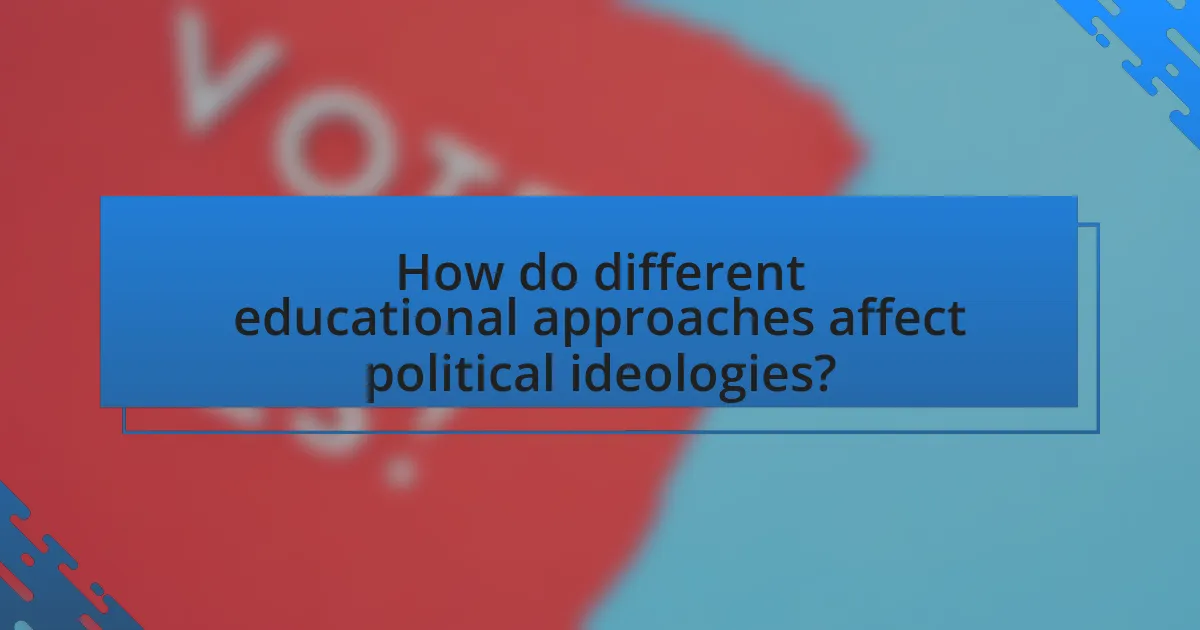
How do different educational approaches affect political ideologies?
Different educational approaches significantly influence political ideologies by shaping individuals’ critical thinking, values, and social awareness. For instance, progressive education emphasizes critical thinking and social justice, often leading to more liberal political views, as seen in studies showing that students from progressive backgrounds tend to support policies promoting equality and environmental sustainability. Conversely, traditional education, which focuses on rote learning and authority, may reinforce conservative ideologies, as evidenced by research indicating that students in such environments often prioritize stability and tradition over change. These educational frameworks create distinct pathways for how individuals engage with political concepts, ultimately affecting their ideological leanings.
What are the differences between formal and informal education in shaping political beliefs?
Formal education systematically imparts knowledge through structured curricula and institutions, while informal education occurs through life experiences and social interactions. Formal education, such as high school and university programs, often includes courses on political science, history, and civic education, which provide students with foundational knowledge about political systems and ideologies. Research indicates that individuals who engage in formal education tend to have more structured political beliefs, as they are exposed to diverse viewpoints and critical thinking skills.
In contrast, informal education, which encompasses discussions with family, peers, and media consumption, shapes political beliefs through personal experiences and social contexts. This type of education can lead to more subjective and varied political perspectives, as individuals interpret information based on their unique backgrounds and environments. Studies show that informal education can significantly influence political engagement and activism, particularly among younger demographics who may be more responsive to social movements and peer influences.
Thus, while formal education provides a structured foundation for understanding political beliefs, informal education allows for a more personalized and dynamic development of those beliefs.
How does informal education contribute to political awareness?
Informal education significantly contributes to political awareness by providing individuals with diverse perspectives and critical thinking skills outside traditional classroom settings. This type of education often occurs through community engagement, social interactions, and media consumption, which expose individuals to various political ideologies and current events. Research indicates that informal learning environments, such as community organizations and social movements, enhance civic participation and political knowledge, as they encourage discussions and debates that foster a deeper understanding of political issues. For instance, studies show that individuals involved in grassroots activism are more likely to be politically informed and engaged, demonstrating the effectiveness of informal education in shaping political awareness.
What impact does higher education have on political engagement?
Higher education significantly enhances political engagement by increasing individuals’ knowledge, critical thinking skills, and civic participation. Research indicates that college-educated individuals are more likely to vote, participate in political discussions, and engage in community service compared to those with lower educational attainment. For instance, a study by the U.S. Census Bureau shows that in the 2020 presidential election, 76% of individuals with a bachelor’s degree voted, compared to only 50% of those without a high school diploma. This correlation suggests that higher education fosters a greater understanding of political processes and encourages active involvement in democratic practices.
How do cultural and social contexts influence educational impact on political ideologies?
Cultural and social contexts significantly influence the educational impact on political ideologies by shaping the values, beliefs, and norms that are transmitted through educational systems. For instance, in collectivist societies, education often emphasizes community and social responsibility, which can lead to the development of political ideologies that prioritize social welfare and collective action. Conversely, in individualistic cultures, education may focus on personal achievement and autonomy, fostering political ideologies that value individual rights and free-market principles. Research indicates that educational curricula reflect the dominant cultural narratives, which in turn affect students’ political socialization and ideological development. For example, studies show that students exposed to diverse perspectives in education are more likely to adopt pluralistic political views, while those in homogeneous environments may develop more rigid ideological stances.
What role does socioeconomic status play in educational access and political beliefs?
Socioeconomic status significantly influences educational access and political beliefs. Individuals from higher socioeconomic backgrounds typically have greater access to quality education, which fosters critical thinking and civic engagement, leading to more informed political beliefs. Conversely, those from lower socioeconomic backgrounds often face barriers such as underfunded schools and limited resources, which can hinder educational attainment and result in less engagement in political processes. Research indicates that education levels correlate with political participation; for instance, a study by the Pew Research Center found that individuals with higher education levels are more likely to vote and engage in political discussions. This demonstrates that socioeconomic status not only affects educational opportunities but also shapes the political landscape by influencing the beliefs and participation of different social groups.
How do regional differences in education affect political ideologies?
Regional differences in education significantly influence political ideologies by shaping the values, beliefs, and knowledge of individuals within those regions. For instance, areas with higher educational attainment often exhibit more progressive political views, as education fosters critical thinking and awareness of social issues. Conversely, regions with lower educational levels may lean towards conservative ideologies, often valuing tradition and stability over change. Research indicates that states with higher percentages of college graduates tend to support policies like universal healthcare and climate change initiatives, while those with lower educational attainment may resist such changes, reflecting a correlation between education levels and political preferences. This dynamic illustrates how educational disparities can lead to divergent political landscapes across different regions.
What are the contemporary challenges in education’s role in shaping political ideologies?
Contemporary challenges in education’s role in shaping political ideologies include the influence of misinformation, the polarization of political views, and the accessibility of quality education. Misinformation, particularly through social media, undermines critical thinking and promotes biased perspectives among students. Polarization leads to an environment where educational institutions may struggle to present balanced viewpoints, resulting in echo chambers that reinforce existing beliefs. Additionally, disparities in access to quality education exacerbate inequalities, limiting the ability of diverse populations to engage in informed political discourse. These challenges hinder education’s potential to cultivate informed, critical citizens capable of contributing to democratic processes.
How does misinformation in education affect political beliefs?
Misinformation in education significantly distorts political beliefs by shaping individuals’ understanding of political issues and ideologies. When educational content is inaccurate or misleading, it can lead to the formation of biased opinions and reinforce existing prejudices. For instance, studies have shown that students exposed to false narratives about historical events or political systems are more likely to adopt skewed perspectives that align with those narratives. Research conducted by the Stanford History Education Group found that students often struggle to differentiate between credible and non-credible sources, which can result in the acceptance of misinformation as fact. This acceptance can perpetuate divisive political ideologies and hinder informed civic engagement, ultimately affecting democratic processes and societal cohesion.
What strategies can be employed to combat misinformation in educational settings?
To combat misinformation in educational settings, educators can implement critical thinking curricula that encourage students to analyze sources and evaluate information. Research indicates that teaching students how to discern credible information significantly reduces the impact of misinformation. For instance, a study by the Stanford History Education Group found that students who received instruction on evaluating online sources were better equipped to identify misinformation compared to those who did not receive such training. Additionally, fostering an environment that promotes open dialogue and discussion allows students to confront and challenge misinformation collaboratively, further enhancing their analytical skills.
How can educators promote critical thinking to foster informed political ideologies?
Educators can promote critical thinking to foster informed political ideologies by implementing inquiry-based learning strategies that encourage students to analyze diverse perspectives. This approach allows students to engage with multiple viewpoints, fostering an environment where they can question assumptions and evaluate evidence critically. Research indicates that inquiry-based learning enhances critical thinking skills, as demonstrated in a study by the National Research Council, which found that students exposed to such methods show improved analytical abilities and a deeper understanding of complex issues. By facilitating discussions, debates, and collaborative projects, educators can create a classroom atmosphere that values critical inquiry, ultimately leading to more informed and nuanced political ideologies among students.
What best practices can enhance education’s role in shaping positive political ideologies?
Integrating critical thinking and civic education into curricula enhances education’s role in shaping positive political ideologies. Critical thinking equips students with the ability to analyze information, question assumptions, and engage in informed discussions, fostering a culture of open dialogue and respect for diverse viewpoints. Civic education, which includes lessons on democratic principles, rights, and responsibilities, encourages active participation in the political process. Research from the Center for Information and Research on Civic Learning and Engagement indicates that students who receive civic education are more likely to vote and engage in community service, demonstrating a direct link between education and positive political engagement.
How can inclusive curricula promote diverse political perspectives?
Inclusive curricula can promote diverse political perspectives by integrating multiple viewpoints and historical narratives into educational content. This approach encourages critical thinking and fosters an understanding of various political ideologies, allowing students to engage with perspectives that differ from their own. Research indicates that when curricula include diverse voices, such as those from marginalized communities, students develop a broader worldview and greater empathy towards differing political beliefs. For example, studies show that exposure to diverse political thought in educational settings can lead to increased civic engagement and a more informed electorate, as students learn to appreciate the complexity of political issues and the importance of dialogue in democracy.
What initiatives can schools implement to encourage civic engagement among students?
Schools can implement initiatives such as service-learning programs, civic education curricula, and student-led civic engagement projects to encourage civic engagement among students. Service-learning programs integrate community service with academic learning, allowing students to apply classroom knowledge to real-world issues, which has been shown to enhance civic responsibility. Civic education curricula provide students with knowledge about government, rights, and responsibilities, fostering informed citizenship. Additionally, student-led civic engagement projects empower students to identify community issues and develop solutions, promoting active participation in democracy. Research indicates that these initiatives significantly increase students’ civic knowledge and engagement levels, as evidenced by studies conducted by the Center for Information and Research on Civic Learning and Engagement.
What practical steps can educators take to effectively shape political ideologies?
Educators can effectively shape political ideologies by integrating critical thinking and discussion-based learning into their curricula. This approach encourages students to analyze various political perspectives and develop their own informed opinions. Research indicates that classrooms fostering open dialogue about political issues lead to greater civic engagement among students (National Assessment of Educational Progress, 2018). Additionally, educators can utilize diverse resources, such as current events, historical case studies, and multimedia content, to provide a well-rounded understanding of political ideologies. By promoting an environment where students feel safe to express differing viewpoints, educators can cultivate a more nuanced understanding of political discourse.
